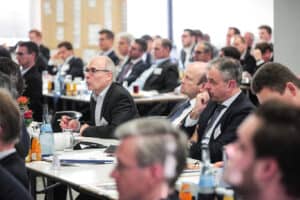
“Despite protectionist tendencies which are observable worldwide – keyword: US election – we approach 2017 with optimism,” explained Dr Dietrich Birk, Director of the Regional Subsidiary of the VDMA in Baden-Württemberg. With this statement, he made it very clear at the outset of the congress that German mechanical engineering with its more than 1 million jobs will continue to be a very attractive employer in the future. However, the working environment in mechanical engineering will change as the result of globalization, digitalization, and individualization. “In view of an ever-greater speed of change, it is no longer appropriate to rely on trends but to prepare for constant changes,” Wilhelm Goschy, COO of the Staufen AG consultancy, pointed out. The clear message of the Lean Management expert: “Companies have to become agile organizations in which learning is one of the essential basic competencies – Lean equals learn!” The importance of communication in such cultural and digital transformation processes was also emphasized by Dr Guido Hegener, Managing Director of the EMAG Maschinenfabrik GmbH, at whose site in Salach (Göppingen District) the 2016 Mechanical Engineering Congress had been held. He pointed out that cultural change is a continuous process. “The process is the objective, and on this journey, you continuously discover new areas that can be improved,” EMAG Managing Director Hegener explained. This approach also was the common theme of subsequent workshops and presentations (including by Aerzener Maschinenfabrik, PAMA, Alstom, Rolls Royce and SEW EURODRIVE). The former VDMA Managing Director Ulrich Hermani who chaired the meeting as Staufen AG Senior Advisor summarized the insights gained at the Mechanical Engineering Congress at the end as follows: “Mechanical engineering has to change in order to progress. This change requires a new corporate and leadership culture to turn companies into learning organizations.” As he pointed out, this also included making managers and employees fit for this future, with transparent communication of all actions and expectations playing a central part. “An essential part of this is to consistently utilize the opportunities of an interconnected world for new forms of production and cooperation, with the ultimate aim of achieving flexible companies in which the main focus is on the human factor,” Hermani concluded.
Press release (.pdf) Press release (.rtf) Download impressions of the congress


